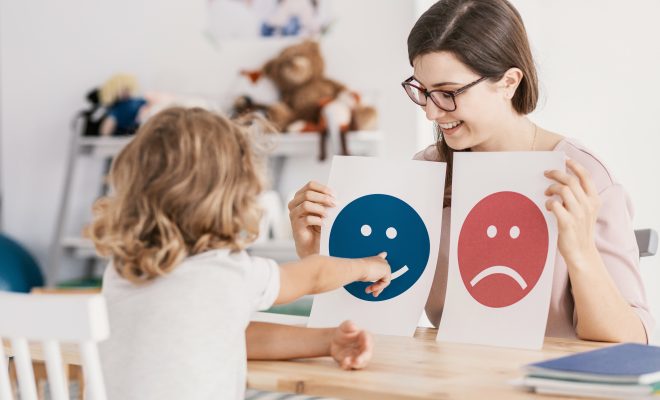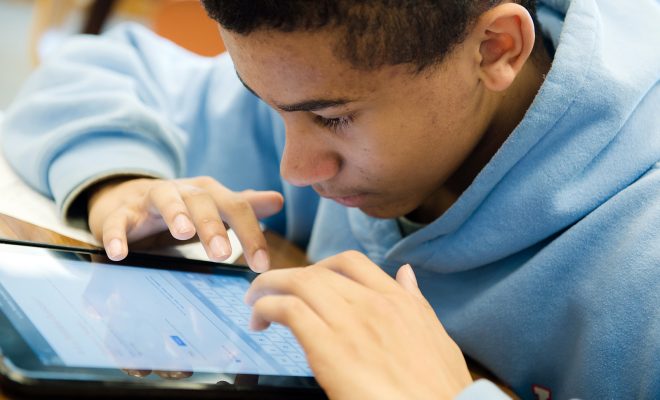A Parents Guide to Montessori Preschool Programs

One of the most popular preschool programs is the Montessori program, which Maria Montessori started in Rome. Montessori education is kid-centered, with the teachers merely acting as learning guides. Each kid learns at their own pace through play and manipulatives. This philosophy also means kids of various ages may be in the same class.
Do you hope to ignite your young kids’ love of learning and lay the foundation for a promising future? The Montessori approach to early childhood education will start that process in a loving environment where your young kid will thrive.
The early childhood level, for kids ages 2 ½ – 6, encourages kids to explore and discover and take ownership of their education.
The Environment
In a Montessori early childhood class, highly trained teachers create a customized environment crafted to their unique capabilities, interests, and learning styles.
This approach to learning is “hands-on.” Dr. Maria Montessori believed that moving and learning are inseparable. In the prepared class, kids work with specially designed manipulative contents that invite exploration and engage the senses in the process of learning.
All learning activities support kids in choosing meaningful and challenging work at their interest and ability level. This kid-directed engagement strengthens motivation, supports attention, and encourages responsibility.
The Classroom Space
A Montessori early childhood class feels more like a home than a school. You won’t see desks, nor will an educator stand at the front of the room, delivering a lesson to the whole class. Instead, you’ll see kids happily working individually or in small groups, at tables or on the floor near small mats that delineate their space.
Specially designed learning contents are displayed on open shelves, easily accessible to the kids. Classrooms also consist of low sinks accessible to the kids, kid-sized furniture, and reachable shelves with work available for free choice, and kid-sized kitchen utensils for learners to eat and prepare snacks.
The Kindergarten Year
In the first two years in an early childhood class, Montessori learners look forward to their turn to be a leader. In their third year—often known as Kindergarten—kids get their turn and take pride in being the oldest. They serve as role models for younger learners; they show leadership and citizenship skills. They reinforce and consolidate their learning by teaching ideas they have already learned to their peers. In their Kindergarten year, they express confidence and show responsibility.
Kindergarteners are introduced to progressively advanced Montessori contents and sophisticated, fascinating lessons. And they experience a crucial period in which their previous learning from working with concrete Montessori contents begins to become permanent knowledge. A Montessori Kindergarten learner sees and feels their individual growth as they watch others learn info they have learned themselves.
Kindergarten is the end of the early childhood program. Kids exhibit the independence, critical thinking, collaboration, and leadership they have been practicing during their previous years in the early childhood class, exercising them independently as they prepare to transition into an Elementary program.
What is Taught?
Teachers carefully observe their kids in the early childhood environment, identifying their interests and capabilities, and creating personalized learning plans tailored to each kid’s needs. They guide the learning, introducing new lessons as appropriate. The educator offers the encouragement, time, and tools needed to let kids’ organic curiosities drive learning.
After participating in a demonstration of content from an educator, your kid is free to select activities and work independently or with a partner for as long as they wish. There is usually only one book; your kid will develop patience and self-control as they wait for content to become available.
The Montessori early childhood curriculum is based on a 3-year sequence. The educator guides your kid through learning at their pace; their personalized learning plan may exceed the ideas they would be taught in a class environment in which each kid learns the same concept simultaneously.
As kids move forward, they develop the ability to concentrate and make decisions and create self-control, courtesy, and an idea of community responsibility.
The Curriculum
The early childhood class offers your kid five areas of study: Practical Life, Sensorial, Math, Language, and Cultural Studies. What are the lessons in these areas?
Practical Life
Children learn daily-life skills, such as getting dressed, preparing snacks, setting the table, and caring for plants and animals. They also learn appropriate social interactions, like saying please and thank-you, being kind and helpful, listening without interrupting, and resolving conflicts peacefully.
Sensorial
Kids refine skills in perceiving the world through their different senses and learn how to explain and name their experiences. It lays the foundation for learning by creating the ability to classify, sort, and discriminate—skills necessary in math, geometry, and language.
Math
Through hands-on activities, kids learn to identify numerals, understand place-value and the base-10 system, and practice addition, subtraction, multiplication, and division. Also, they explore patterns in the numbering system. With an exploratory approach, kids do more than just memorize math facts; they gain a firm understanding of the meaning behind them.
Language
Throughout the early childhood class, activities teach language, help kids acquire vocabulary, and develop writing and reading skills. The ability to write, a prerequisite for reading, is taught first. Using hands-on contents, kids learn letter sounds, how to combine sounds to make words, how to build sentences, and how to utilize a pencil. Once these skills are acquired, kids spontaneously learn to read.
Cultural Studies
A range of subjects are integrated into lessons in the curriculum’s cultural area. Kids learn about their community and the world around them. Discovering comparisons and contrasts among people and places helps them understand and appreciate our world’s diversity and respect for each living thing.
Montessori Learning Materials
Montessori contents are not only beautiful and inviting, but life-changing. They teach only one skill to let the kid work independently and master the intended concept. The contents are also “self-correcting.” This means the kid can identify if they have done an activity accurately and try again without an educator’s intervention. Working with self-correcting content helps kids develop confidence and self-sufficiency and promotes critical thinking. In a sense, they become their teachers—a skill that will last for life.






